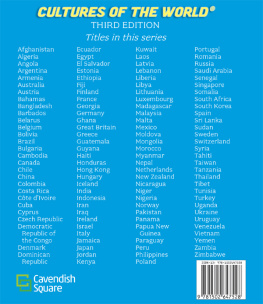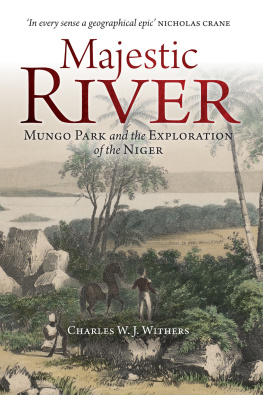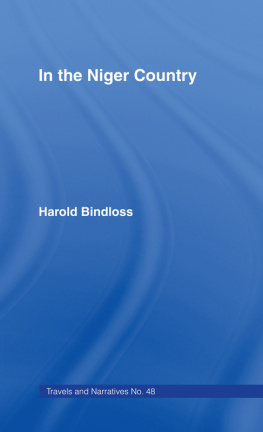Routledge Library Editions
THE NIGER JOURNAL
OF RICHARD AND
JOHN LANDER
ANTHROPOLOGY AND ETHNOGRAPHY
Routledge Library Editions
Anthropology and Ethnography
AFRICA
In 26 Volumes
I | Spirit Mediumship and Society in Africa | Beattie & Middleton |
II | Custom & Politics in Urban Africa | Cohen |
III | Urban Ethnicity | Cohen |
IV | Order and Rebellion in Tribal Africa | Gluckman |
V | Death, Property and the Ancestors | Goody |
VI | The Family Estate in Africa | Gray & Gulliver |
VII | Tradition and Transition in East Africa | Gulliver |
VIII | The Human Factor in Changing Africa | Herskovits |
IX | African Ecology and Human Evolution | Howell & Bourlire |
X | The Nandi of Kenya | Huntingford |
XI | Fields of Change among the Iteso of Kenya | Karp |
XII | The Niger Journal of Richard and John Lander | Hallett |
XIII | Defeating Mau Mau | Leakey |
XIV | Mau Mau and the Kikuyu | Leakey |
XV | Urbanization as a Social Process | Little |
XVI | Family and Social Change in an African City | Marris |
XVII | Widows and their Families | Marris |
XVIII | Tribes without Rulers | Middleton & Tait |
XIX | Neighbours and Nationals in an African City Ward | Parkin |
XX | The Last Trek | Patterson |
XXI | Women of Tropical Africa | Paulme |
XXII | Hunger and Work in a Savage Tribe | Richards |
XXIII | Leopards and Leaders | Ruel |
XXIV | Western Civilization and the Natives of South Africa | Schapera |
XXV | East African Societies | Shorter |
XXVI | The Samburu | Spencer |

First published in 1965
Reprinted in 2004 by
Routledge
2 Park Square, Milton Park, Abingdon, Oxon, OX14 4RN
Transferred to Digital Printing 2006
Routledge is an imprint of the Taylor & Francis Group
1965 Robin Hallett
All rights reserved. No part of this book may be reprinted or reproduced or utilized in any form or by any electronic, mechanical, or other means, now known or hereafter invented, including photocopying and recording, or in any information storage or retrieval system, without permission in writing from the publishers.
The publishers have made every effort to contact authors/copyright holders of the works reprinted in Routledge Library Editions Anthropology and Ethnography. This has not been possible in every case, however, and we would welcome correspondence from those individuals/companies we have been unable to trace.
These reprints are taken from original copies of each book. In many cases the condition of these originals is not perfect. The publisher has gone to great lengths to ensure the quality of these reprints, but wishes to point out that certain characteristics of the original copies will, of necessity, be apparent in reprints thereof.
British Library Cataloguing in Publication Data
A CIP catalogue record for this book is available from the British Library
The Niger Journal of Richard and John Lander
ISBN 978-0-415-32991-0
ISBN 978-1-136-53052-4 (ePub)
Miniset: Africa
Series: Routledge Library Editions Anthropology and Ethnography
Printed and bound by CPI Antony Rowe, Eastbourne

First published 19 65
by Routledge & Kegan Paul Ltd
Broadway House, 6874 Carter Lane
London, E.C .4
Printed in Great Britain
by Richard Clay (The Chaucer Press), Ltd
Bungay, Suffolk
Robin Hallett 1965
No part of this book may be reproduced
in any form without permission from
the publisher, except for the quotation
of brief passages in criticism
Travellers and Explorers
The Niger Journal of Richard and John Lander is the first volume in a series, travellers and explorers, designed to provide new editions of some of the great works of travel and exploration. Although the series has been newly planned, it is intended as a successor to the Broadway travellers, which ran to twenty-six volumes under the general editorship of two very distinguished scholars, the late Sir Edward Denison Ross and the late Eileen Power.
The last volume of that series appeared in 1937. In the generation that has passed since then, with the waning of European power and the emergence of the new nations of Asia and of Africa, the world has been transformed. In nineteenth-century Europe the growth of nationalism was accompanied by a deepening and widening of historical studies; in the same way the revolutionary movements of the twentieth century have led people in Asia, Africa, and Latin America to look back on their own past, to discover anew the richness of their own heritage, and to challenge many of the preconceptions accepted by Europeans in the age of imperialism. Stimulated by this new tide of ideas, some Europeansespecially those with first-hand experience of the new nationshave grown increasingly critical of the one-sidedness of much European historical writing. The expansion of Europe is perhaps the greatest single theme in modern history; yet Europes expansion is a subject more complex than most European historians have assumed, a movement that can only be truly understood when looked at not only through European but also through Asian, African, or Latin American eyes. It is this exhilarating and revolutionary development in historical studies that gives to the works of early European travellers a new and deeper significance.
For at their best the European travellers of an earlier age were objective and sympathetic observers of the countries through which they passed. So their accounts can be regarded as historical documents of the greatest importance, throwing in many cases a flood of light on states and societies for which other forms of historical evidencelocal chronicles, official records, and all the other types of material in which Europe is so richmay be lacking. To Asian and African historians, in particular, as they attempt to unravel the past of their own countries, the accounts of early European travellers are likely to prove the most stimulating of sources.














